The officers and soldiers stepped from their cars. They were armed, masked and wearing brown camouflage uniforms. There were no words. They began to fire. Rubber bullets. Tear gas. The residents screamed, forced from their homes, running through the red dirt streets of their communities.
Just before dawn on November 25, federal police and military vehicles arrived to three occupations of landless workers in the north of the state of Bahia: Abril Vermelho, Dorothy, and Irany.
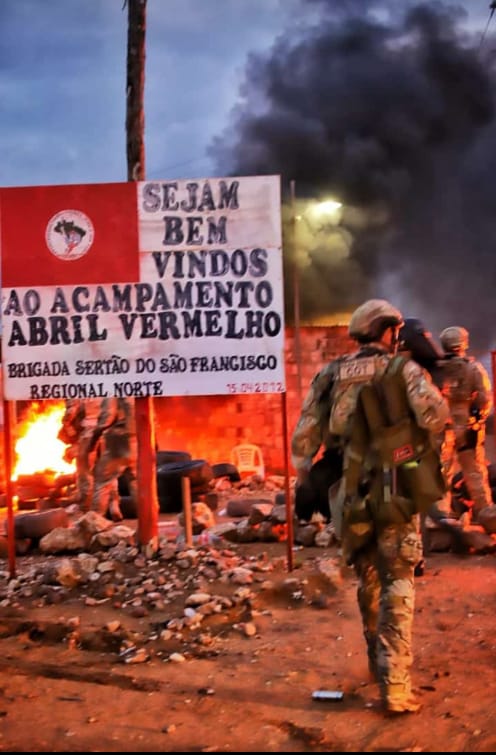
Photo: Abril Vermelho encampment residents
Seven hundred families, connected to the country’s Landless Workers Movement, MST, had lived in these communities since 2012. They had built their homes with their own hands. They constructed schools, where hundreds of their children studied. They raised goats and sheep. They farmed, and theirs was a growing enterprise: last year, they say they grew 7,200 tons of agricultural products —melons, grapes, yucca and salad greens— and created jobs for 5,000 people.
The morning attacks, which took place simultaneously in all three communities, saw people peppered with projectiles. Some vomited from the gas, a helicopter droned overhead. Children cried and screamed. Pepper spray rolled in over their villages, as if it were a low-hanging fog, pushing people out as the sun rose crimson under thick clouds.
Then came the tractors. The residents watched from a distance, forcing back tears, as the arm of the large yellow cat punched down into the tin roof of the first home in the Abril Vermelho occupation. It dragged down the brick-red cinder block wall. Dust from the destroyed homes spewed into the morning air. The motor of the large machine whined and groaned, as if in protest.
Eyewitness Felipe de Sena e Silva told Toward Freedom that by ten in the morning, half of the homes in the occupations were destroyed. By sundown, the communities were completely levelled.
“I don’t know where to go now,” said one of the residents of Abril Vermelho, a pregnant mother of two, who asked not to be named for fear of reprisals. “I have nowhere to go. This was my only home.”
Not long ago, Brazil’s government walked a thin, complicated line between protecting the right to private property and the right to agrarian reform. Today, that line has been obliterated.
Here, like elsewhere in the country, land is the battleground. Land reform has ground to a halt. Representatives of powerful landowners and corporate agriculture have risen to power in the government of the far-right former military captain Jair Bolsonaro. Inequality in the countryside is back on the rise, coupled with an uptick in murders and threats against the movement and its leaders. But in Brazil, landless workers have made it clear they will not go quietly.
The morning after the eviction, MST members protested across northern Bahia, shutting down highways with pickets and burning tires. Black fumes billowed upwards under a grey sky. A growing line of cars and trucks waited for the road to be cleared.
“The landless workers are mobilized and protesting the police violence used during the eviction,” said Maristela Cunha, a local MST leader. “We have confronted other authoritarian governments, and this one is not going to take away our right to fight for the land.”
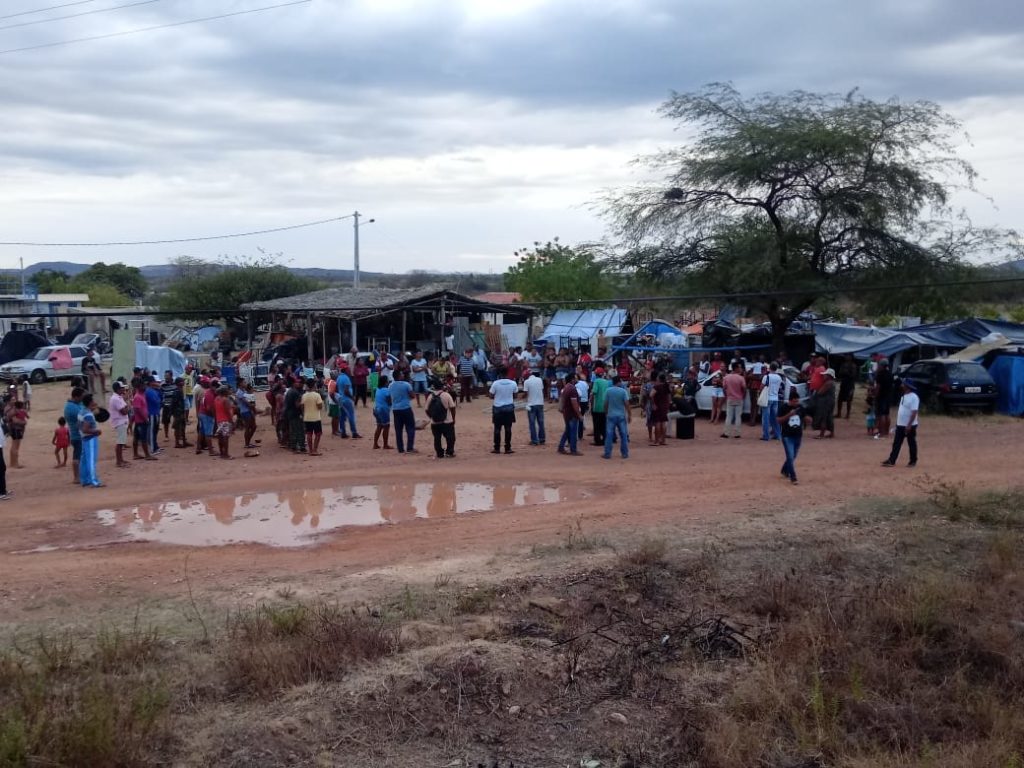
Brazil’s Landless Workers Movement is one of the largest and most successful social movements in the hemisphere. Since the MST’s founding in 1984, roughly 350,000 families have acquired land by occupying territory and living on it as a way to force the government to follow through with Constitutionally mandated agrarian reform.
In the middle of the countryside in the state of Paraná, 1,700 miles south of Bahia and roughly a four-hour drive east from the iconic Iguaçu Falls, one of Brazil’s largest concentrations of MST settlements, the term the movement uses for the land legally handed over to its members from the government.
The settlements extend over a huge region, and the accomplishments of the residents are impressive.
Five thousand six hundred families are settled there or living on land occupations. They compose roughly eighty percent of the population of the local municipality, of Quedas do Iguaçu, and produce a major portion of the beans, corn, and local produce for the region. In 2015, 1,600 families working in local cooperatives on three different settlements produced a record 150,000 liters per day of milk, which was sold across Paraná and neighboring states. Other cooperatives farm and prepare baked goods, and cook a special Sunday brunch with cakes, sweets, and endless savory dishes that people travel for miles to attend.
On their land are municipal schools, a campus of the Federal University of the Southern Border, and several elementary schools attended by hundreds of children whose families are still fighting to win their land.
Kids buzz around the open courtyard of the Vagner Lopes elementary school, a complex of several wooden one-roomed classrooms built by their parents four years ago. Until halfway through this year, one of the students was 8-year-old Kethelyn Vitória, a precocious girl with brown eyes and dirty blond hair. Her legs swung between the plastic chair and the wooden floor. Their teacher, Adriana Monteiro walked around the room as they flipped through magazines and books, reading sentences and paragraphs.
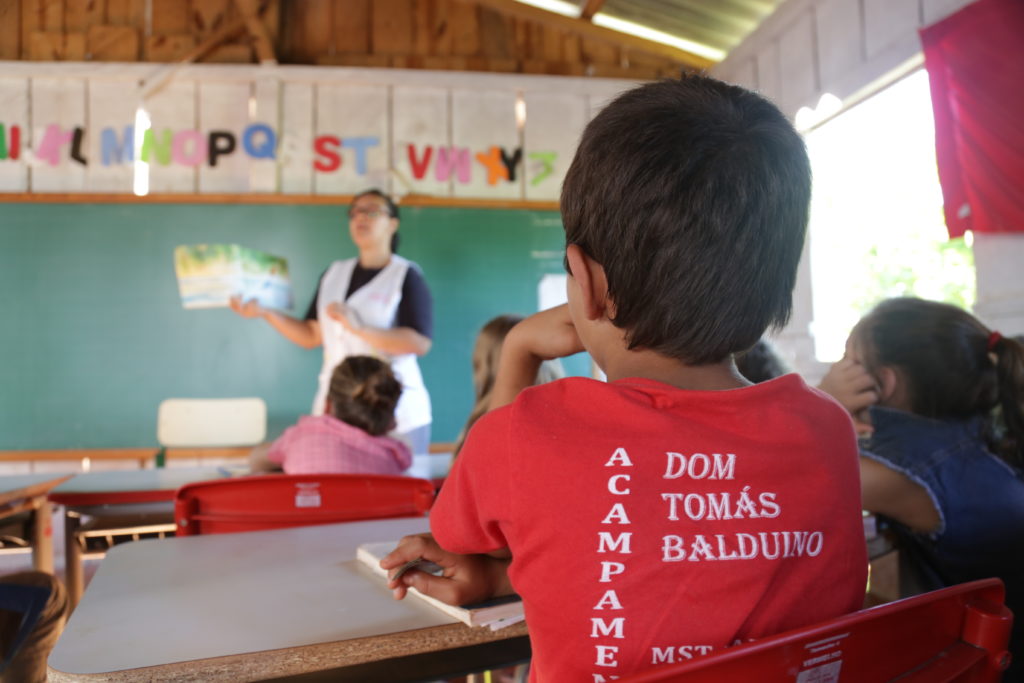
For several years, Kethelyn lived with her mother, and their sister in a home-made wooden cabin a short walk up the dirt path from the school, on the other side of the Dom Tomás Balduino MST encampment. Many afternoons she would walk home, hand-in-hand with one of her best friends, a much taller brown-haired neighbor.
But in April, the encampment moved to three “pre-settlements,” on nearby land several miles away. The communities have been planting, clearing land, and constructing homes. A new school was built, where Kethelyn now studies, just down the path from her new house. They are building what they hope will remain permanent communities in the countryside.
MST members generally live on occupied land, called encampments, until the state hands over land, often purchased from large estates for agrarian reform. It is on these lands that MST members build what they call “settlements.” The pre-settlement, as in the case of the former Dom Tomás Balduino community, is an amorphous middle-ground.
It’s a move so residents can spread out and build more permanent housing, as well as farm larger areas of land than on the more tightly packed encampments. The decision to establish a pre-settlement could also be seen as a way of getting one step ahead of the government forces, which have been evicting encampments around the country. On the pre-settlements, which extend over a much larger area, it is harder to knock everyone off in one push.
The MST says the pre-settlements founded from Dom Tomás Balduino were established on state land, because the areas were embroiled in an illegal case of forged property rights. But the community doesn’t have the title to the land. The settlers know they’re not going to get it. Not anytime soon. Not from the Bolsonaro government. They are pushing forward anyhow. The idea of setting up “pre-settlements” is part of what members of the movement call “active resistance” to the Bolsonaro government — taking action, instead of waiting on sometimes precarious land occupations for agrarian reform that will not come.
Throughout the 2000s, landless workers won big victories: the government of Luiz Inácio Lula da Silva expropriated land from large landowners and handed it over to small farmers living on land occupations around the country.
But the process slowed in the beginning of the decade, under president Dilma Rousseff, as Brazil sank into recession as commodity prices tanked. Rousseff faced increasing pressure from right-wing street protests and conservative members of her own governing coalition.
In 2016, she was impeached for supposed illegal budgetary maneuvers, in a thinly veiled congressional coup that ousted the leftist president. Then, as today, the powerful rural caucus, representing corporate and large landowners, controlled almost a third of congress. Its members voted overwhelmingly to impeach Rousseff. Incoming president Michel Temer eliminated the Ministry of Agrarian Development, which had overseen land reform since 1999, and gutted laws that had previously regulated agrarian reform in the country.
“This began the unprecedented attack on the rights and achievements of the Indigenous, small fishermen and landless farmers in Brazil,” Federal University of Bahia professor Celi Taffarel told Toward Freedom. “It’s an extremely serious situation.”
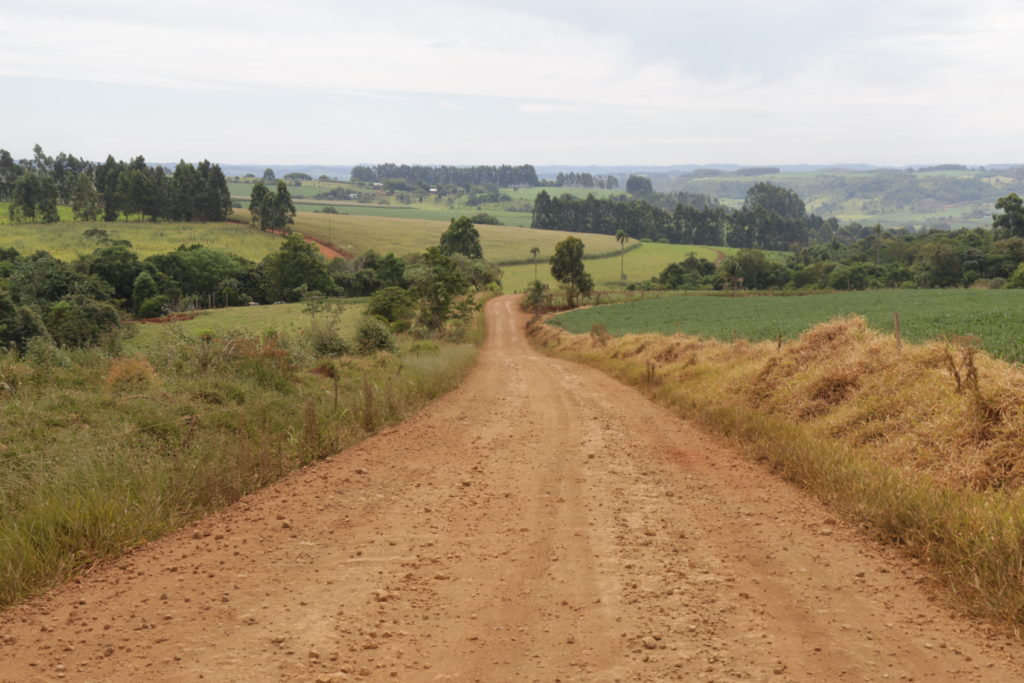
Bolsonaro was swept into the presidency on October 28, 2018, as a Trump-like outsider pushed by a viral social media campaign riddled with fake news and promises of breaking the left and destroying the politically correct. Former president Lula led all of the polls heading into the election, but he was jailed and barred from running because of a corruption charge by a biased judge, which many saw as a move to block him from returning to power.
Evangelicals, large landowners and the rural caucus jumped to support Bolsonaro. They have become pillars of his base. Their power has swelled under his government. Bolsonaro appointed the former head of the Big Ag caucus Tereza Cristina his Agriculture Minister, where she has overseen the approval of 467 new pesticides since January. Almost half of the active ingredients in these products are banned in Europe. Bolsonaro placed Nabhan Garcia in charge of land reform, a contradiction by nature. Garcia is a large landowner and the former president of the Rural Democratic Union, a group linked to rural paramilitaries who have long organized against the MST.
“Land invasions are a crime,” Garcia said in an interview in November 2018. “We are going to end them. There will be no support from this government.”
Bolsonaro has promised to forgive as much as $4 billion in debt that large landowners owe to the federal government. He has also been a vocal opponent of the MST. He has vowed to do away with activism, label its members “terrorists,” jail them, close their schools, and push them from the land they have held for years.
Bolsonaro’s discourse has spurred hate crimes and violence against his opponents, empowering groups and individuals that have long seen the MST and other social movements as criminals in the countryside. The outcome has been deadly for Indigenous and landless workers.
Just weeks after Bolsonaro’s election last year, two MST leaders of the Zumbi dos Palmares MST settlement in the state of Paraíba were gunned down by hitmen. In July, 72-year-old MST member Luis Ferreira da Costa was intentionally run over and killed by a Bolsonaro supporter during a protest near his occupation in Valinhos, São Paulo.
“This is a result of the hate speech from the current president. It’s like carte blanche for people to do what they want,” Erivan Hilario, a longtime member of the Workers Movement, told Toward Freedom. “It’s connected to this whole discourse in society legitimizing torture and the dictatorship and even the persecution of people that think differently.”
Violent attacks against the MST and small farmers, of course, did not begin with Bolsonaro. The Pastoral Land Commission, registered 1,438 conflicts in the countryside between 1985 and 2017, resulting in the deaths of 1,904 people.
In particular, killings and conflicts in the countryside were rife under the administrations of Fernando Henrique Cardoso, who ran the country from 1995 to 2002. The worst massacre was the killing of 19 landless workers by state security forces in Eldorado do Carajás, in Southern Pará state on April 17, 1996.
But according to some in the MST, the organization has never faced such a bleak moment as today.
“I’ve never seen anything like this,” de Sena e Silva, an educator, who has been involved with the MST for more than a decade, and who witnessed the Bahia raid, told Toward Freedom in a phone interview in early December. “I never thought I would see the right-wing with the capacity to do what they are doing against the mass grassroots movements, today, kicking us to the street. It’s terrifying.”
Evictions in recent months, like those in Bahia, have rippled across MST communities. Once landless workers are being forced from land they occupied for years, and being made truly landless once again.
In Paraná, Bolsonaro ally, conservative governor Carlos Roberto Massa Júnior, of Brazil’s Social Democrat Party, has had security forces evict eight MST land occupations in just five months. Another 70 encampments, housing 10,000 families are under threat, just in the state. It’s a microcosm of the reality around the country.
Bolsonaro is now actively taking steps to spur on further removals of landless farmer occupations. On the same day as the eviction of the MST occupation in Bahia, Bolsonaro sent a bill to congress that would authorize forced evictions in the countryside in order to “guarantee law and order.” This came four days after he sent another bill to congress that would exempt security forces from punishment for committing crimes or excesses during operations to “guarantee law and order.”
Bolsonaro says they are meant to “start ending the mess… Private property is one of the pillars of democracy.”
The MST and others have called the moves “dictatorial.”
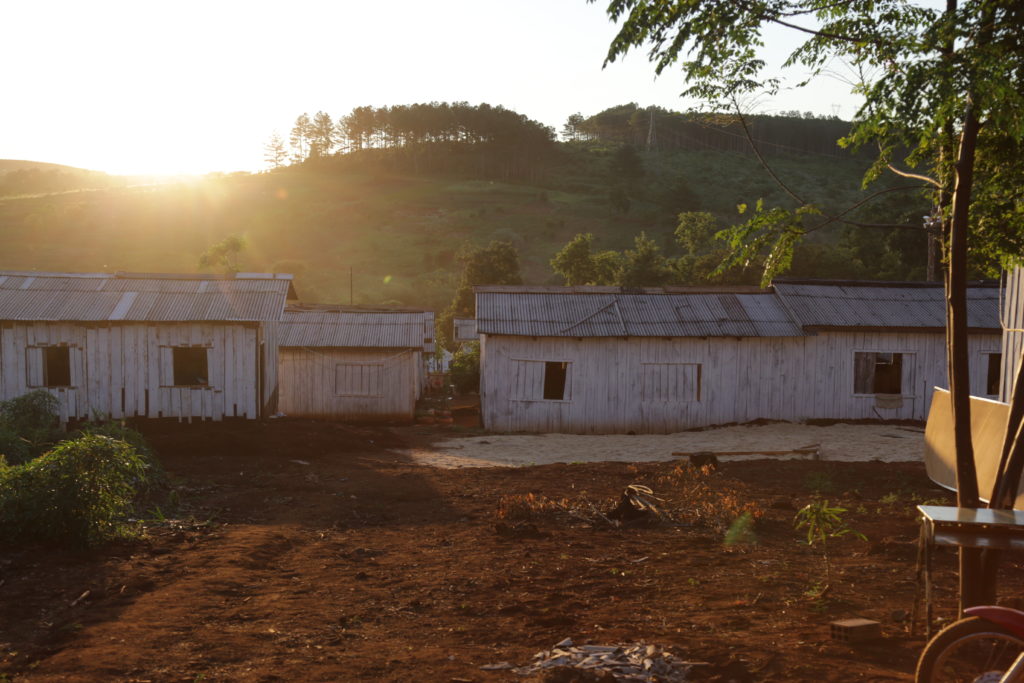
Photo: Michael Fox
In less than a year, Bolsonaro’s government has moved to transform the country’s agrarian reform institute (INCRA) into an institution to defend powerful large landholders. INCRA was once a state body championed by the MST for fighting land concentration in the countryside. Now it is pursuing plans to title individual plots of collective MST land, in a move to divide the settlements and clear the way for its piece-meal sell-off into the vast seas of soy, cattle, and sugar-cane that cover massive areas of the country.
“The permanent attempt to privatize the settlements through land titling is one of the top attacks against the movement,” says movement veteran Hilario. “This is one of the strategies to break the movements apart in the countryside. Individualizing. To roll back the collective organization, because the settlements are collectively organized. So, the attempt to seduce settlers with land titling is an attempt to dismantle and demobilize the MST.”
Government institutions like INCRA were created to ensure the democratization of property and land in one of the most unequal nations in the world. One percent of landowners control nearly 50 percent of land in the country, the most concentrated land distribution since the end of the dictatorship, according to the most recent figures from Brazil’s Statistics Institute.
Now, government institutions protecting the poor have been decimated, while the interests of the powerful are ever more consolidated. Inequality, despite gains from the welfare programs enacted under the Workers Party governments, which lifted millions from poverty, is back on the rise.
Bolsonaro’s promise to open up Indigenous territories for development is part of this push to please powerful interests, sometimes individual, sometimes corporate.
Agribusiness is king. It rules the economy and Brazilian exports. In March, agribusiness products made up 47 percent of all exports. Brazil ranks number one in world production and exports of coffee, sugar, beef, poultry, orange juice and tobacco, and number two in soybeans, after the United States. The production of these products for export — in particular, cattle and soy — is a major factor driving the deforestation of the Amazon rainforest.
In recent decades, Brazil’s agroindustry — fueled by multinationals Bunge and Cargill (with Unilever, Nestlé, and ADM also ranking high) — has grown exponentially. These groups have thrown their full support behind Bolsonaro. He, in return, has promised that the sector will continue to grow, both in and out of the Amazon, with the hopes that demand for commodities will continue to drive economic growth.
The MST —rooted in agro-ecology and small farming to produce food for local regions— has long been clear that the agribusiness is its true enemy, whether it is producing eucalyptus for paper pulp, sugarcane for biofuels, soy, cattle, or other monocrops.
In the place of land for food and jobs for local farmworkers, agribusiness champions mechanization, monocropping and profits for bosses in Sao Paulo and New York. The plants look green, and they may fuel supposed sustainable energy in biofuels, but they are multi-billion-dollar industries and their expansion pushes small farmers off their land and feeds the fires in the Amazon. In the country’s fragile Pantanal wetlands and the forests of the Amazon alike, Bolsonaro lifted a ban on the planting of sugarcane, which had been levied to stay the rising tide of deforestation in those regions.
And the war waged by agribusiness and powerful elites on small farmers can be deadly.
In November 2018, a month after Bolsonaro’s electoral win, a Paraná court found the Swiss agrochemical multinational Syngenta guilty in the 2005 killing of the 34-year-old MST leader Valmir Mota de Oliveira. According to reports, Syngenta was illegally experimenting with genetically modified crops in an area occupied by Mota de Oliveira and other landless farmers. Syngenta’s armed private security force attacked the farmers, killing Mota de Oliveira and injuring four others.
Justice was served, but it took 13 years, and it was one of the rare cases with a resolution. In Brazil, impunity reigns.
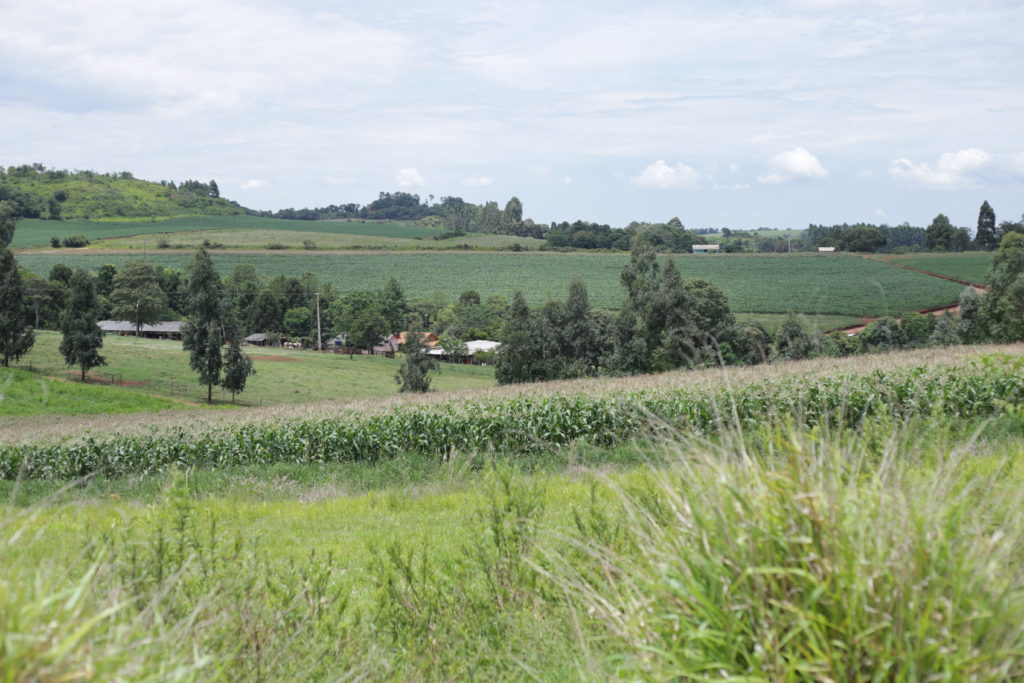
The day after the November eviction of the 700 families from Northern Bahia occupations, MST member Gilvansilva Gilvan posted a video on his Facebook which shows him walking through the communities’ once abundant fields, now trampled and the banana trees destroyed.
“Look what this government is doing with the small farmers,” Gilvan tells the camera. “You have 4,391 acres of fruit trees being destroyed.” He points to the horizon where a tractor is ripping through the fields, destroying further produce. “Fields of banana, guava, papaya, potatoes. The tractor is trampling it all.”
He lifts up a banana palm and picks up banana bunch, containing dozens of green baby bananas.
“While our country is suffering from unemployment, more than 4,000 people lived in this area,” he says. “Now, it’s all destroyed.”
Author Bio
Michael Fox is an independent multimedia journalist based in Brazil and a former editor of the NACLA Report on the Americas. He tweets @mfox_us. More of his work can be found at his website.
